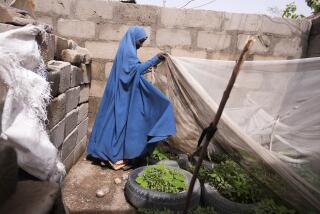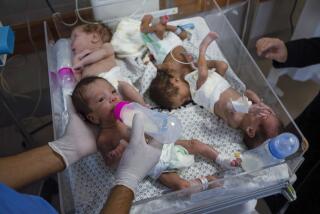Improper Formula Feeding Spreads Malnutrition, Death in Third World : Babies: More than 1.5 million die each year because of campaigns that discourage mothers from nursing, health officials say.
- Share via
ABIDJAN, Ivory Coast — Six-month-old Jhym had withered away to skin and bone by the time doctors first saw him. The diagnosis: malnutrition caused by improper formula feeding.
The doctors said Jhym would survive. But UNICEF estimates that more than 1.5 million other Third World babies die each year because aggressive promotion of infant formula persuades their mothers to bottle-feed rather than breast-feed.
Indiscriminate dumping of large quantities of free or cut-rate powdered baby foods has been an ongoing disaster for babies in the developing world, where many families live without electricity, clean water and refrigeration to easily sanitize and preserve formula. Abidjan is one of the continent’s most modern cities, with skyscrapers and six-lane highways, but 30% of the population does not have running water at home.
Improperly prepared, mixed with dirty water or over-diluted, formula-feeding can lead to malnutrition, diarrhea, dehydration and death.
Babies in the Third World fed exclusively on infant formula are 16 times more likely to die in infancy than babies fed only breast milk, said Dr. Mark Belsey, head of the World Health Organization’s Maternal and Child Health Division.
Those fed a mixture of formula and breast milk are four times more likely to die than babies fed breast milk alone.
Ivorian doctors say their efforts to control the distribution have brought retaliation from Nestle, the Swiss-based food giant, which now refuses to donate any formula at all. Nestle contends that it cut off supplies as part of a government-sanctioned study on the impact of withdrawing free formula.
Ivory Coast’s main hospital, once flooded with free samples, now has a shortage and cannot afford to buy enough to feed abandoned babies or those whose mothers are ill.
The situation poses a moral dilemma for Africa’s cash-strapped hospitals, said Andoh Joseph, head of the pediatric service at Abidjan’s state-run University Hospital Center.
“No, we don’t want them handing out their products to mothers and persuading them against breast-feeding. But we need their products for mothers who have no choice,” he said. “Does this mean hospitals should start paying? It’s a difficult question.”
The lack of free formula can be a problem, but its presence can be deadly.
Formula companies have waged intense publicity campaigns to persuade mothers that formula-fed babies are strongest, happiest, healthiest--tantalizing promises in countries with astronomical infant-mortality rates.
“The publicity convinced them it was the easiest and healthiest way to nourish their children. And it has become ‘la mode’ (fashionable) because the formula comes from abroad,” said Taye Gbaou Georgette, a pediatric nurse who helped start the Ivorian branch of the International Baby Food Action Network, a Geneva-based organization that promotes breast-feeding.
Conditions among illiterate peasants are duplicated in towns where more and more women are working outside the home and leaving babies with uneducated relatives or maids.
Jhym’s parents are middle-class white-collar workers. Embarrassed by their son’s condition, they asked that their names not be used. They said they left him with his illiterate grandmother so his mother could return to her secretarial job.
Nurses said the grandmother fed Jhym insufficient amounts of formula and that he lost more than half his body weight before his parents took him to the clinic, a U.S.-financed oral rehydration center opposite Andoh’s office.
The baby looked like a famine victim, belly bloated, stick-like limbs, a tiny skeleton clearly visible through a stretch of skin. Most of his hair had fallen out, and what was left had turned orange, a sign of severe malnutrition. While other children at the clinic were being fed with spoons of oral rehydration liquid, Jhym was so weak a drip had to be attached to his nose for the fluid to be pumped in with a syringe.
“It’s scandalous,” Taye said. “Formulas are over-diluted or not diluted enough, and usually mixed with unclean implements. Babies get constipation, diarrhea, malnutrition. Some die.”
Medical staff have colluded with the formula food companies, Taye said, promoting a particular brand in exchange for gifts.
Her organization and the Ivorian government Institute of Public Health, where she works, this year began sensitizing medical personnel. A nurse at a center treating malnourished victims said one of her colleagues was so angered by the sorry state of children ill-fed on formula that she nearly came to blows with another nurse she accused of promoting formula.
Andoh said he was trying to persuade working mothers to pump out their breast milk and have baby-sitters feed it to babies with bowls and spoons to avoid the difficulty of having to sanitize feeding bottles and nipples.
Cost is a factor for the formula, which usually is imported to Third World countries short of foreign currency. UNICEF estimates that it costs 50% to 140% of what the average person makes in a year to formula feed a baby in Africa.
Mother’s milk, on the other hand, is free, sterile and warm. It contains the perfect nutrients for optimum brain growth and natural antibodies that help protect babies from a wide range of diseases, a boon for Africa’s vulnerable infants.
Activists promoting breast-feeding in Ivory Coast have successfully fought formula advertising. But Taye said they have to be ever-watchful.
“Recently, Nestle has started advertising its Cerelac baby cereal on television again,” she said.
Nestle, the largest manufacturer of cocoa products in the world, is well entrenched in the Ivory Coast, which is the world’s third-biggest cocoa producer.
“I tried to boycott Nestle, but it is near impossible here because they dominate the food market,” said UNICEF program officer Grace S. Hemmings-Gapihan.
She was responding to the International Baby Food Action Network’s charges that Nestle was continuing to push its formula food at Third World hospitals--a practice the company promised to stop in 1984, giving in to a seven-year worldwide boycott.
Last year, the baby food network renewed the boycott, charging that Nestle was not keeping to World Health Organization guidelines on advertising and distribution.
Hospital staff refused to be specific about visits by baby food manufacturing representatives. But, Taye said, “They (Nestle representatives) visited hospitals as recently as January, though their visits are becoming rarer and they have stopped handing out free formula.”
Nestle spokesman Francois Perroud in Geneva stressed that Nestle abides by WHO code and by additional national guidelines and laws.
“Our policy is clear. We are willing to give free supplies where products can be helpful. But . . . because we are fundamentally committed to breast-feeding, we want to make sure that free supplies are only used for babies that have to use infant formula,” he said.
“Nestle is committed to efforts aimed at the support of breast-feeding and improving the health of women and children.”
Other companies that have not agreed to the WHO guidelines have rushed to fill the vacuum, Taye said.
Andoh said he has banned representatives from leaving their samples and pamphlets in waiting rooms and wards.
“We have said they should not stop coming, but that they must work through us, that we must decide which children need artificial feeding because the mothers do not know the dangers,” he said. “Our new policy has cost us our (free) supplies.”
More to Read
Sign up for Essential California
The most important California stories and recommendations in your inbox every morning.
You may occasionally receive promotional content from the Los Angeles Times.










